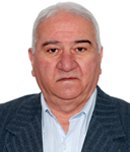
Plenary Lecture
Investigation of Some Unfavorable Atmosphere Processes Development on the Territory of Georgia by WRF Modeling

Professor Teimuraz Davitashvili
I. Vekua Institute of Applied Mathematics
Tbilisi State University
Georgia
E-mail: teimuraz.davitashvili@tsu.ge
Abstract: Regional climate formation above the territory of complex terrains is conditioned due to joint actions of large-scale synoptic and local atmospheric processes where the last one is basically stipulated by complex topography structure of the terrain. The territory of Caucasus and especially territory of Georgia are good examples for that. As known the global weather prediction models can well characterize the large scale atmospheric systems, but not enough the mesoscale processes which associated with regional complex terrain. With the purpose of modeling these smaller scale atmospheric phenomena and its characterizing features it is necessary to take into consideration main features of the local terrain, heterogeneity of land surfaces, influence of large scale atmosphere processes on the local scale processes etc. Recently the Weather Research and Forecasting (WRF) models represent a good opportunity for studding regional and mesoscale atmospheric processes such are: regional climate, extreme precipitations, hails, influence of orography on mesoscale atmosphere processes, sensitivity of WRF to physics options such are: microphysics, cumulus parameterizations, surface physics, planetary boundary layer physics and atmospheric radiation physics. Taking into account this broad availability of parameterizations it is not easy to define the right combination that better describes a meteorological phenomenon dominated above the investigated region. In the present article we have configured the nested grid WRF v.3.6 model for the Caucasus region, taking into consideration geographical-landscape character, topography heights, land use, soil type, temperature in deep layers, vegetation monthly distribution, albedo and others. Computations were performed by High Performance Computer systems. The ability of the WRF model in prediction precipitations with different microphysics and convective scheme components taking into consideration complex terrain of the Georgian territory was tested. Some results of the numerical calculations performed by WRF model are presented.
Brief Biography of the Speaker: Prof.Teimuraz Davitashvili holds a 5-year Diploma in Mathematics (specialization Hydro-air Mechanics) from Tbilisi State University (1972). In 1985 he received the Ph.D and in 1997 the Doctor of Physics and Mathematics upon the doctoral thesis “ Numerical Modelling of Some Problems of Atmosphere Physics for Mountain Regions“. Since 1972- researcher, senior researcher, head of department at I.Vekua Institute of Applied Mathematics of Tbilisi State University. From 1994 to 1998 an Associate Professor and from 1999 to 2006 a Full Professor of Tbilisi State University. From 2006 to 2013 head of department of Weather Forecast and Modelling of Natural and Anthropogenic Catastrophic Events at the Hydrometeorological Institute of Georgia. Currently head of laboratory of Mathematical Modelling and Numerical Analyses atTbilisi State University. He published 1 book, about 145 research papers in various scientific journals and international conference proceedings. His general research interests are: environment pollution, climate change, modeling in applied mathematics, simulation of non-ordinary events and weather forecast by numerical methods.